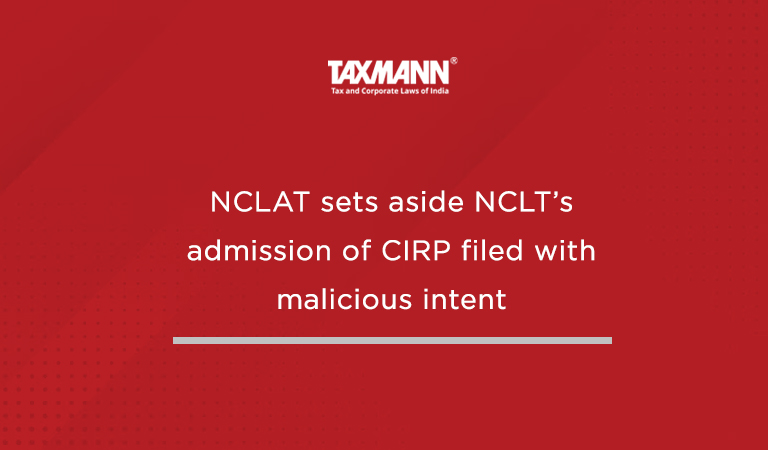NCLAT sets aside NCLT’s admission of CIRP filed with malicious intent
- News|Blog|Insolvency and Bankruptcy Code|
- 2 Min Read
- By Taxmann
- |
- Last Updated on 28 February, 2023

Case Details: Dolphin Vintrade (P.) Ltd. v. Ashray Vyapaar (P.) Ltd. - [2023] 147 taxmann.com 233 (NCLAT-New Delhi)
Judiciary and Counsel Details
-
- Justice Ashok Bhushan, Chairperson, Ms Shreesha Merla & Naresh Salecha, Technical Member
- Sanjeev Sen, Sr. Adv., Gaurav Kejriwal & Arjun Aggarwal, Advs for the Appellant.
- Abhinav Vasisht, Sr. Adv., Sadapurna Mukherjeem, Shaunak Mitra, Patita Paban Bishwal, Sumesh Dhawan, Neeraj Kr. Gupta, Advs. Ankit Kohli, Manju Bhuteria, Abhishek Jain, Sudhir Bansal, Tanamay Mehta & Aveenash Garg for the Respondent.
Facts of the Case
In the instant case, winding up petition was admitted against the corporate debtor and the corporate debtor was under liquidation since 1997. Later, in 2007, respondent No. 1 (R1) claimed to have obtained assignments of debts by secured creditors of the corporate debtor.
On 19-12-2019, the petition of winding up of corporate debtor was dismissed for want of prosecution by the High Court. Subsequently, on 20-2-2020, R1 filed an application under section 7 of IBC against the corporate debtor for initiation of the CIRP and the same was admitted.
Thereafter, an appeal was made to the National Company Law Appellate Tribunal (NCLAT) against the order passed by the NCLT. It was noted that in section 7 application filed by R1, date of default was mentioned as 19-12-2019, when winding up petition was dismissed for non-prosecution, which order was subsequently recalled.
NCLAT Held
The NCLAT observed that since R1 was guilty of suppression of material facts and relevant orders before the Adjudicating Authority (NCLT) and suppression was made only with motive to obtain an admission order to somehow grab assets of corporate debtor, the NCLT committed an error in admitting section 7 application.
The NCLAT held that the section 7 application didn’t explain how the dismissal of winding-up petition in default could give cause of action for filing of a section 7 application. Further, the application didn’t explain how default could be committed by a company after the liquidation process had commenced.
As a result, the application didn’t deserve admission and, therefore, the order passed by the NCLT admitting section 7 application was to be set aside.
List of Cases Reviewed
-
- Ashray Vyapaar Ltd. v. Gourepore Co. Ltd. [2023] 147 taxmann.com 232 (NCLT – Kol.) (para 35) reversed. [See Annex]
List of Cases Referred to
-
- Jugal Kishore Yadav v. Gourepore Co. Ltd. (In Liqdn) [CA No. 453 of 2013, dated 14-7-2014] (para 2)
- Gourepore Co. Ltd. (In liquidation) v. Ashray Vyapaar (P.) Ltd. [CA No. 107 of 2016, dated 5-12-2016] (para 2)
- Ashray Vyapaar (P.) Ltd. v. Carnation’s Distributors [Special Leave to Appeal (C) No. (SC) 22997 of 2017, dated 18-9-2017] (para 2)
- Gourepore Co. Ltd. v. Official Liquidator [CA No. 107 of 2016, dated 9-8-2017] (para 4)
- A. Navinchandra Steels (P.) Ltd. v. SREI Equipments Finance Ltd. [2021] 125 taxmann.com 50 (SC)/[2021] 4 SCC 435 (para 6)
- Jugal Kishore Yadav v. Gourepore Co. Ltd. (In Liqdn) [Company Petition No. 355 of 1997, dated 14-7-2014] (para 11)
- Dena Bank v. C Shiva Kumar Reddy [2021] 129 taxmann.com 60 (SC)/[2021] 10 SCC 330 (para 27).
Disclaimer: The content/information published on the website is only for general information of the user and shall not be construed as legal advice. While the Taxmann has exercised reasonable efforts to ensure the veracity of information/content published, Taxmann shall be under no liability in any manner whatsoever for incorrect information, if any.

Taxmann Publications has a dedicated in-house Research & Editorial Team. This team consists of a team of Chartered Accountants, Company Secretaries, and Lawyers. This team works under the guidance and supervision of editor-in-chief Mr Rakesh Bhargava.
The Research and Editorial Team is responsible for developing reliable and accurate content for the readers. The team follows the six-sigma approach to achieve the benchmark of zero error in its publications and research platforms. The team ensures that the following publication guidelines are thoroughly followed while developing the content:
- The statutory material is obtained only from the authorized and reliable sources
- All the latest developments in the judicial and legislative fields are covered
- Prepare the analytical write-ups on current, controversial, and important issues to help the readers to understand the concept and its implications
- Every content published by Taxmann is complete, accurate and lucid
- All evidence-based statements are supported with proper reference to Section, Circular No., Notification No. or citations
- The golden rules of grammar, style and consistency are thoroughly followed
- Font and size that’s easy to read and remain consistent across all imprint and digital publications are applied



 CA | CS | CMA
CA | CS | CMA
